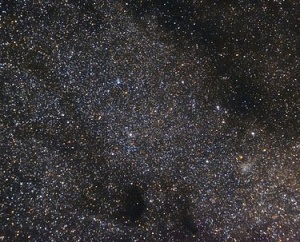Messier 24: Difference between revisions
No edit summary |
No edit summary |
||
| (One intermediate revision by the same user not shown) | |||
| Line 2: | Line 2: | ||
The Sagittarius Star Cloud (also known as Delle Caustiche, Messier 24, IC 4715) is a star cluster in the constellation of [[Sagittarius]], approximately 600 light years wide, which was discovered by Charles Messier in 1764. It is sometimes known as the Small Sagittarius Star Cloud to distinguish it from the Great Sagittarius Star Cloud located to the north ofGamma Sagittarii and Delta Sagittarii. | The Sagittarius Star Cloud (also known as Delle Caustiche, Messier 24, IC 4715) is a star cluster in the constellation of [[Sagittarius]], approximately 600 light years wide, which was discovered by Charles Messier in 1764. It is sometimes known as the Small Sagittarius Star Cloud to distinguish it from the Great Sagittarius Star Cloud located to the north ofGamma Sagittarii and Delta Sagittarii. | ||
The stars, clusters and other objects comprising M24 are part of the Sagittarius or Sagittarius-Carina arms of the Milky Way galaxy. Messier described M24 as a "large nebulosity containing many stars" and gave its dimensions as being some 1.5° across. Some sources, improperly, identify M24 as the faint cluster NGC 6603. | The stars, clusters and other objects comprising M24 are part of the Sagittarius or Sagittarius-[[Carina]] arms of the Milky Way galaxy. Messier described M24 as a "large nebulosity containing many stars" and gave its dimensions as being some 1.5° across. Some sources, improperly, identify M24 as the faint cluster NGC 6603. | ||
M24 fills a space of significant volume to a depth of 10,000 to 16,000 light-years. This is the most dense concentration of individual stars visible using binoculars, with around 1,000 stars visible within a single field of view.<ref>[http://en.wikipedia.org/wiki/Sagittarius_Star_Cloud Sagittarius Star Cloud]</ref> | M24 fills a space of significant volume to a depth of 10,000 to 16,000 light-years. This is the most dense concentration of individual stars visible using binoculars, with around 1,000 stars visible within a single field of view.<ref>[http://en.wikipedia.org/wiki/Sagittarius_Star_Cloud Sagittarius Star Cloud]</ref> | ||
| Line 8: | Line 8: | ||
HGS Sessions - Clearing [[Temple Mount, Jerusalem.]] - 3/20/2015 <ref>HGS Session</ref> | HGS Sessions - Clearing [[Temple Mount, Jerusalem.]] - 3/20/2015 <ref>HGS Session</ref>HGS Sessions - Clearing [[El Obour City, Cairo Governorate, Egypt]] - 4/2/2015 <ref>HGS Session</ref> | ||
==References== | ==References== | ||
Latest revision as of 19:58, 6 September 2015
The Sagittarius Star Cloud (also known as Delle Caustiche, Messier 24, IC 4715) is a star cluster in the constellation of Sagittarius, approximately 600 light years wide, which was discovered by Charles Messier in 1764. It is sometimes known as the Small Sagittarius Star Cloud to distinguish it from the Great Sagittarius Star Cloud located to the north ofGamma Sagittarii and Delta Sagittarii. The stars, clusters and other objects comprising M24 are part of the Sagittarius or Sagittarius-Carina arms of the Milky Way galaxy. Messier described M24 as a "large nebulosity containing many stars" and gave its dimensions as being some 1.5° across. Some sources, improperly, identify M24 as the faint cluster NGC 6603. M24 fills a space of significant volume to a depth of 10,000 to 16,000 light-years. This is the most dense concentration of individual stars visible using binoculars, with around 1,000 stars visible within a single field of view.[1]
HGS Session References
HGS Sessions - Clearing Temple Mount, Jerusalem. - 3/20/2015 [2]HGS Sessions - Clearing El Obour City, Cairo Governorate, Egypt - 4/2/2015 [3]
References
- ↑ Sagittarius Star Cloud
- ↑ HGS Session
- ↑ HGS Session
Found in HGS Manual on Page 108
Found in HGS Manual on Page 115


